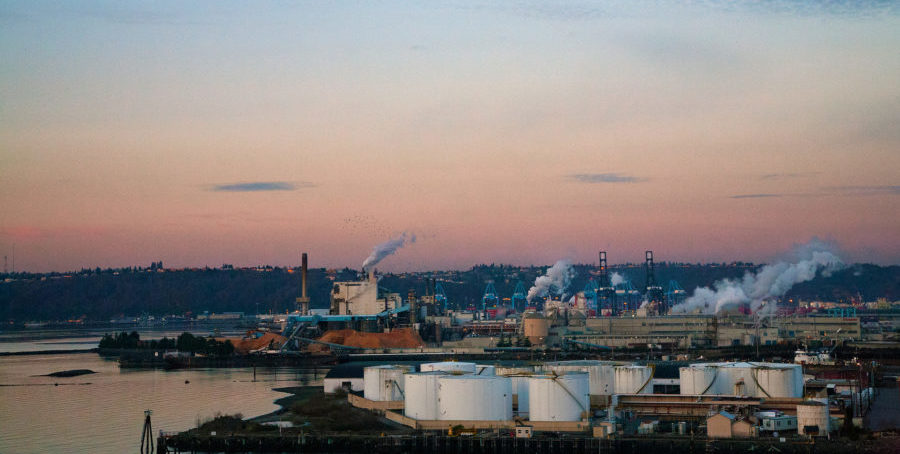Editor’s note: this piece originally published Oct. 10. Since then, Tacoma City Council heard public comment from more than 81 people and got more than 200 written comments. The council is set to vote on an amended ordinance Tuesday, Nov. 13, to extend the current land-use rules by six months. The below information outlines what’s at stake for the Tacoma Tideflats and the surrounding communities.
Tacoma, long a center of heavy industry, is heir to a proud working-class legacy—and to enduring pollution.
In particular, the city’s industrial port area, known as the Tideflats, is no stranger to dirty energy proposals. It was targeted in recent years for a large-scale petrochemical refinery, a fracked gas liquefaction center, oil trains, and more.
Despite considerable progress by local leaders and ordinary residents alike, the city remains among the most at-risk Northwest communities for fossil fuel development. Last year, Tacoma city council unanimously passed a one-year moratorium prohibiting any new development of fossil fuel projects in the Tideflats. The moratorium was supposed to give the city breathing room to initiate a more complete—and permanent—approach to writing new land-use laws for the industrial port. It was also an unequivocal statement that Tacoma is moving in a new direction: toward cleaner and less divisive development.
But Tacoma’s port is still threatened by dirty energy projects grafted onto existing industrial facilities, which were exempted from the moratorium. On top of that, the Tideflats moratorium is set to expire in November. Tacoma city council is set to weigh renewal—and possible expansion—of the measure this month. There will be a public hearing at 5:30 p.m., October 23, at the Rialto Theater, 310 S. 9th St., and amendments weighed on October 30.
The city’s final vote to possibly expand and extend the moratorium is scheduled for November 6.
WHAT’S AT STAKE
In addition to an ongoing fight over a highly controversial liquefied natural gas plant, there are two newer and less well-understood schemes to bring more petroleum to Tacoma.
One would modify an existing petroleum terminal to handle “natural gasoline” delivered by rail. Targa Sound Terminals, a petroleum handling facility, applied for permits to manage trains loaded with “natural gasoline,” a volatile and unstable by-product of fracked gas. Natural gasoline, sometimes used as a transportation fuel, would be delivered to the site by trains with as many as 107 tank cars, passing near residential areas, important water bodies, and the Puyallup Tribe’s reservation along the way. If permitted, the company aims to modify four of its on-site storage tanks to accommodate the fuel.
Complicating matters, Targa announced September 12 an agreement to sell its Tacoma facility to a private equity firm called ArcLight Capital Partners. The Boston-based company owns thousands of miles of gas pipelines, dozens of petroleum processing plants, and several oil production assets in the Gulf of Mexico. It’s not clear what the new owners have planned for the site or the mothballed refinery there, but the company boasts that it will “target opportunities with substantial growth potential.”
The other project would expand capacity at an oil refinery. Nearby, the US Oil refinery submitted a permit application to boost its capacity for handling ethanol by almost 10,000 barrels per day—roughly equivalent to a quarter of the facility’s current refining capacity. The company wants to expand by upgrading storage tanks, installing new loading and transfer pumps, and building new transfer pipelines between the refinery and the docks. If it becomes operational, US Oil would blend ethanol with other fuels before shipping it back out on trucks or barges. Because it is highly flammable, ethanol derailments can be deadly, and Tacoma has seen several in recent years though none have resulted in injuries.
This project, too, raises many unanswered questions and it would undoubtedly increase spill risks as more fuel-laden vessels wend their way through the Salish Sea. Tacoma’s US Oil officials have also been lobbying in Canada to expand the Trans Mountain Pipeline in order to obtain more shipments of heavy crude oil. Like other refineries on Puget Sound, US oil appears to be aiming for long-term, incremental expansion: more refining capacity, more oil-by-rail handling, more tanker traffic, more carbon pollution, and more risk of spills.
As Tacoma weighs renewal of its moratorium on fossil fuel growth, the city once again finds itself at a crossroads. There’s every reason to believe that dirty energy projects will continue to target the City of Destiny. Yet leaders can choose to expand their protections to preclude growth at existing facilities too.

